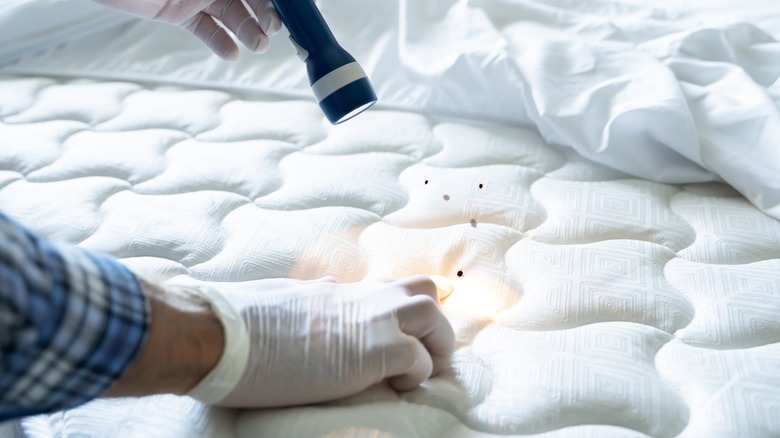This Midwest City Continues To Top The Charts Of The Most Bed Bug-Infested In The US
Chicago, located on the shores of Lake Michigan, is beloved by tourists. Activities in the Windy City range from diverse to historical. Art lovers, for example, can view works by Van Gogh, Matisse, Renoir, and more at The Art Institute of Chicago. Love sports? You can catch a Chicago Cubs game at Wrigley Field. And if you're a foodie, eating a deep-dish pizza or a Chicago-style hot dog is a must. Beyond the flashing city lights, Chicago has an unfortunate reputation. The city is known for its unwanted pest problem.
In early 2023, Orkin named Chicago the most bed-bug-infested city in the country. It also received this distinction in 2021 and 2022. If you've never encountered bed bugs, consider yourself lucky. Bed bugs feed on blood and are similar in appearance to ticks. But unlike ticks, bed bugs do not spread diseases. However, the minuscule reddish-brown insect does bite, causing itchiness and, on some occasions, allergic reactions, as per WebMD.
Generally speaking, bed bugs have been on the rise in recent years. According to the BBC, genetic mutations have made them indestructible in many ways. Thus, they keep reproducing and discretely spreading from one location. That said, Chicago's hotels, homes, businesses, and more are susceptible to bed bugs. The city, albeit unsuccessfully, has been taking action against bed bugs since 2013.
Chicago's Bed Bug Ordinance
Given that Chicago is the third largest city in the country, it's perhaps no surprise that bed bugs are rampant. According to WBEZ, bed bugs have been a problem in Chicago since at least 2003. In late 2012, the city council proposed the Bed Bug Ordinance to combat the issue. NBC Chicago notes that this occurred shortly after Orkin declared Chicago the most bed-bug-infested city in the country in 2013. The Bed Bug Ordinance passed in June that year, making bed bugs an official public nuisance.
As such, landlords and tenants have responsibilities when it comes to bed bug infestations. Per the ten-page ordinance, landlords must seek professional help to eliminate bed bug infestations within 10 days of knowing about it and ensure that the matter is properly dealt with. On the other hand, tenants must inform landlords within five days that there is a bed bug infestation.
For wary travelers, the Bed Bug Ordinance applies to public establishments like hotels. This should be a given, but if a hotel knows a room has bed bugs, it's off-limits to guests. Similarly, the hotel has to ensure it takes the right steps to eliminate the bed bugs.
In addition, it's prohibited for anyone to dump a bed bug-infested item (like sheets, etc.) in the trash unless it's packed and marked as infested with bed bugs. If these regulations are violated, penalty fees go up to $2,000.
How to prevent bringing bed bugs home from your Chicago trip
Bedbugs do not fly but spread through clothing, luggage, bedding, and more. If you're planning a visit to Chicago, note that bed bugs can commonly be found in hotels and public transportation. Rose Pest Solutions, a Chicago-based exterminator service, states that bed bugs increase during the spring and summer.
That said, thoroughly look at reviews while searching for lodging in the Windy City. Chances are, if someone had bed bugs in their hotel room, they wrote about it. Regardless, you should inspect your room for bed bugs after checking in. While you do this, place your luggage in the bathtub as a protective measure. Focus on the bed; a tall tell sign of bed bugs are marks on the mattress that are either blood or feces. However, the mattress seams, headboard, and boxspring are all preferred bed bug hideouts. If you have evidence of an infestation, ask for another room or have a backup hotel if you want to leave.
Even if the coast is clear and you want to take precautions, consider packing your belongings in plastic bags to protect them. Likewise, refrain from placing your luggage on the bed or floor.
When you return home from Chicago, check all your belongings for bed bugs. Preferably keep them outside your home (like in a garage) as you do this. If you don't find anything but still have doubts, applying heat over 120 degrees Fahrenheit will kill bed bugs.


